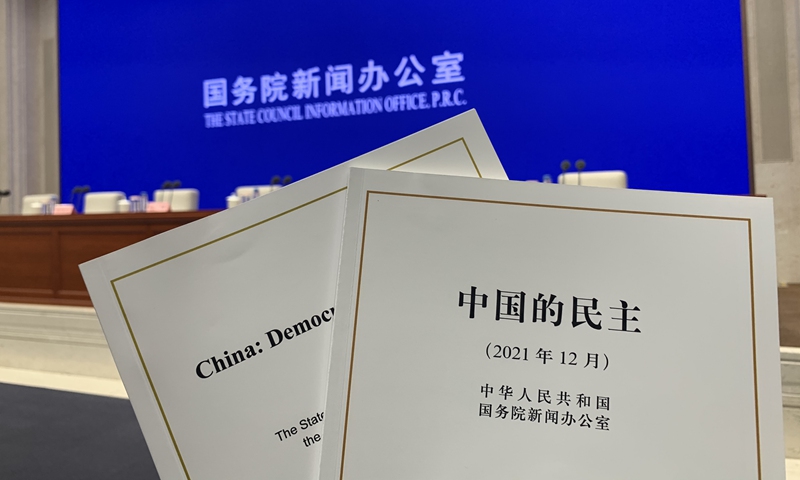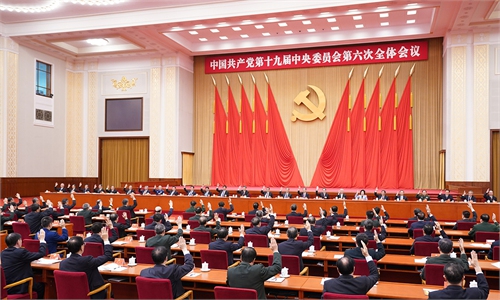
China releases white paper titled "China: Democracy That Works" Photo: Li Xuanmin/GT
The People's Republic of China rose to become the second largest economy in the world in just seven decades after its founding. This unprecedented success is inseparable from China's whole-process people's democracy.Theoretically, the whole-process people's democracy includes democratic election, decision-making, management and oversight by the people, which means people's participation in all major legislative activities is guaranteed through a scientific and democratic decision-making process.
Since the 18th National Congress of the Communist Party of China (CPC), the public has been called on to comment on 187 draft laws. More than 3 million suggestions have been collected. In China, people's opinions are valued regardless of whether it's election period or not. This is the difference with the West where voters are only taken seriously during campaigns.
In contrast, China's whole-process democracy stipulates that "democracy is not for decoration, but for solving problems." This system certainly did not emerge out of thin air, but came from the principle of "the people running the country." It's guided by Marxism and based on its own unique national condition and culture.
There are three traditions which are significant to the establishment of China's whole-process people's democracy.
The first is the people-oriented thought which arose in the early days of Chinese civilization. This philosophy, in short, means that politicians have to keep people and their interests in mind when making decisions. It's a cultural DNA of why China's whole-process democracy values and efficiently responds to public opinion.
Only by comprehending China's tradition of people-oriented philosophy can we understand why China is able to put common prosperity as its agenda.
The West cannot understand China's people-oriented thought because it doesn't have it. That is why the analysis and judgment of China in the West have been wrong. Based on facts, we can conclude that China has a whole-process people's democracy based on people-oriented thought, while the democracy in the West is based on procedural elections. After decades of competition between the two types of democracies, especially during the COVID-19 pandemic, the Chinese model has proven to be far better than the West's process-based electoral democracy.
The second tradition is practical rationality. To put it simply, the ability to solve problems is the main principle of the thinking of the Chinese nation. This is even more prominent when compared to Western civilization.
Twice in its history, the CPC followed the example of the Soviet Union. First, riots in cities were launched in the early days of the founding of the Party, which failed and had a great cost. The leadership then proposed the strategy of "encircling the cities from rural areas," a complete correction of the Soviet experience.
The second time happened when China followed the Soviet Union to establish a planned economy. But then in 1978, China started its market-oriented reforms and quickly achieved success.
It can be said that the process of practical rationality and development has equipped the CPC with a strong ability to correct mistakes and to respond flexibly to challenges. And China's whole-process people's democracy today is a manifestation of that ability.
The third tradition is comprehensive selection and flow of talents under meritocracy.
US political scientist Francis Fukuyama once argued that China was the first world civilization to establish a modern state. This is because China was the first global civilization to break the limitation of kinship to select talents.
China's institutional model today can select outstanding talents because it is primarily based on national selection, long-term education, and experiences based on ability.
The CPC's great focus on talent selection and education is also a continuation and inheritance of the Chinese tradition of "exalting the worthy."
In summary, the three characters are the three reasons for China's better performance of its whole-process people's democracy than the Western-style democracy.
If we ask the general public what a healthy society is, the answer will be a society that can overcome the epidemic and solve problems. As to the definition of a good democracy, it must be the one that can respond to public opinion effectively. The CPC is capable of creating miracles and exploring a new political civilization for humankind with the strong support of the whole-process people's democracy which is inseparable from the great Chinese culture and its people.
The author is a research fellow at the China Institute, Fudan University. opinion@globaltimes.com.cn


